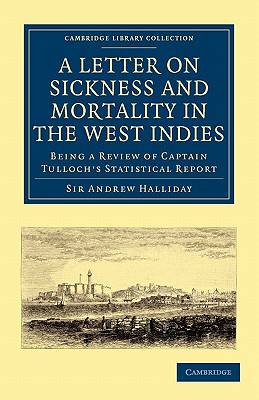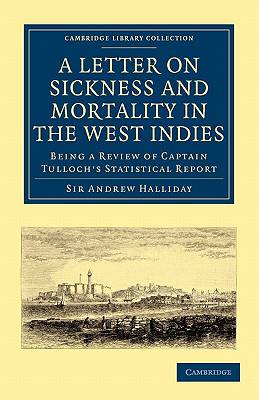
Bedankt voor het vertrouwen het afgelopen jaar! Om jou te bedanken bieden we GRATIS verzending (in België) aan op alles gedurende de hele maand januari.
- Afhalen na 1 uur in een winkel met voorraad
- In januari gratis thuislevering in België
- Ruim aanbod met 7 miljoen producten
Bedankt voor het vertrouwen het afgelopen jaar! Om jou te bedanken bieden we GRATIS verzending (in België) aan op alles gedurende de hele maand januari.
- Afhalen na 1 uur in een winkel met voorraad
- In januari gratis thuislevering in België
- Ruim aanbod met 7 miljoen producten
Zoeken
A Letter to the Right Honourable, the Secretary at War, on Sickness and Mortality in the West Indies
Being a Review of Captain Tulloch S Statistica
Andrew Halliday
€ 56,45
+ 112 punten
Omschrijving
Sir Andrew Halliday (1782-1839) served as a surgeon in the Peninsular War, and then as a royal physician. In 1832 he was appointed Inspector of Hospitals in the West Indies until ill-health forced his return to Scotland. This 1839 pamphlet contains his recommendations to the Secretary of War, concerning the major losses suffered by the army in the West Indies due to illness. It was written in response to the Tulloch report presented to Parliament on the subject the previous year. This showed that the average death rate for soldiers there was almost six times higher than those in Britain, and in some islands considerably higher, due to dysentery, yellow fever and malaria. Halliday believed that many of these deaths were preventable, if medical advice was consulted on the siting of barracks, the daily regimes within them, and sanitation, and if doctors had the authority to implement changes.
Specificaties
Betrokkenen
- Auteur(s):
- Uitgeverij:
Inhoud
- Aantal bladzijden:
- 74
- Taal:
- Engels
- Reeks:
Eigenschappen
- Productcode (EAN):
- 9781108023115
- Verschijningsdatum:
- 9/12/2010
- Uitvoering:
- Paperback
- Formaat:
- Trade paperback (VS)
- Afmetingen:
- 140 mm x 216 mm
- Gewicht:
- 104 g

Alleen bij Standaard Boekhandel
+ 112 punten op je klantenkaart van Standaard Boekhandel
Beoordelingen
We publiceren alleen reviews die voldoen aan de voorwaarden voor reviews. Bekijk onze voorwaarden voor reviews.









